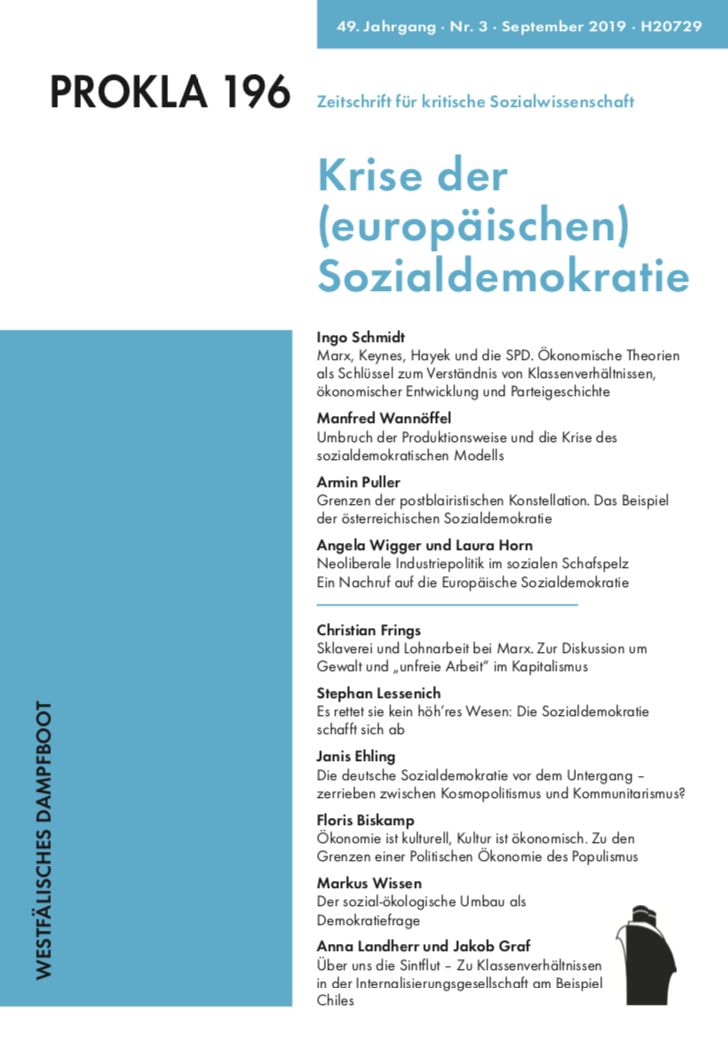Economy is cultural, culture is economic
On the Limits of a Political Economy of Populism
DOI:
https://doi.org/10.32387/prokla.v49i196.1833Keywords:
political economy, populism, racismAbstract
A new round in the debate whether the recent rise of the populist radical right has economic or cultural causes was opened when a number of articles offered new, more complex arguments for an economic explanation – in Germany these new arguments were primarily brought forward by Philip Manow. Even though his book is valuable for the debate, it has three major problems elaborated in this article: First, the concept of populism is not defined and thusly applied arbitrarily; secondly, the relation between culture and economy represented in the book is too one-sided to be convincing; thirdly the economic dimension must be modelled in a more complex fashion to account for the varieties of populism and for international interdependencies.
Downloads
References
Arps, Jan Ole (2019): Hauptsache Hauptwiderspruch. In: ak – analyse & kritik 648.
Becker, Joachim (2018): Neo-Nationalismus in der EU. Sozio-ökonomische Programmatik und Praxis. Materialien zu Wirtschaft und Gesellschaft Nr. 179. Wien.
Bhambra, Gurminder K. (2017): Locating Brexit in the Pragmatics of Race, Citizenship and Empire. In: Outhwaite, William (Hg.): Brexit: Sociological Responses. London, 91-100.
Bhambra, Gurminder K./Holmwood, John (2018): Colonialism, Postcolonialism and the Liberal Welfare State. In: New Political Economy 23(5): 574-587. https://doi.org/10.1080/13563467.2017.1417369.
Bieling, Hans-Jürgen (2017): Aufstieg des Rechtspopulismus im heutigen Europa. Umrisse einer gesellschaftstheoretischen Erklärung. In: WSI Mitteilungen 8/2017: 557-565. https://doi.org/10.5771/0342-300X-2017-8-557.
Boos, Tobias (2018): Ein Hut, zu viele Köpfe – Zu Geschichte und Theorie des Populismusbegriffs. In: PROKLA 48(1): 9-26. https://doi.org/10.32387/prokla.v48i190.29.
Burgoon, Brian/van Noort, Sam/Rooduijn, Matthijs/Underhill, Geoffrey (2018): Positional Deprivation and Support for Radical Right and Radical Left Parties. In: Economic Policy 34(97): 49-93. https://doi.org/10.1093/epolic/eiy017.
Dowling, Emma/van Dyk, Silke/Graefe, Stefanie (2017): Rückkehr des Hauptwiderspruchs. Anmer-kungen zur aktuellen Debatte um den Erfolg der Neuen Rechten und das Versagen der „Identitätspolitik“. In: PROKLA 47(188): 411-420. https://doi.org/10.32387/prokla.v47i188.69.
Eversberg, Dennis (2018): Innerimperiale Kämpfe. Drei Thesen zum Verhältnis zwischen autoritärem Nationalismus und imperialer Lebensweise. In: PROKLA 48(190): 43-53. https://doi.org/10.32387/prokla.v48i190.31.
Flassbeck, Heiner/Lapavitsas, Costas (2013): The systemic crisis of the euro – true causes and effective therapies. Berlin.
Fraser, Nancy (2017). The End of Progressive Neoliberalism (2.1.2017). dissentmagazine.org/online_articles/progressive-neoliberalism-reactionary-populism-nancy-fraser, Zugriff: 18.10.2018.
Heitmeyer, Wilhelm (2018): Autoritäre Versuchungen. Signaturen der Bedrohung I. Berlin.
Helbig, Marcel/Jähnen Stefanie (2019): Wo findet „Integration“ statt? Die sozialräumliche Verteilung von Zuwanderern in den deutschen Städten zwischen 2014 und 2017. WZB-Discussion Paper P 2019-003. Berlin.
Hochschild, Arlie Russel (2016): Strangers in their own land: Anger and mourning on the American right. New York, NY.
Inglehart, Ronald F./Norris, Pippa (2016): Trump, Brexit, and the rise of Populism: Economic have-nots and cultural backlash. Harvard Kennedy Faculty Research Working Paper Series 16(26): 1-52. https://doi.org/10.2139/ssrn.2818659.
van Kersbergen, Kees/Manow, Philip (2009): Religion and the Western Welfare State. The Theoretical Context. In: van Kersbergen, Kees/Manow, Philip (Hg.): Religion, Class Coalitions, and Welfare States. Cambridge: 1-38. https://doi.org/10.1017/CBO9780511626784.
Koppetsch, Cornelia (2019): Gesellschaft des Zorns. Rechtspopulismus im globalen Zeitalter. Bielefeld. https://doi.org/10.14361/9783839448380.
Lengfeld, Holger/Dilger, Clara (2018): Kulturelle und ökonomische Bedrohung. Eine Analyse der Ursachen der Parteiidentifikation mit der „Alternative für Deutschland“ mit dem Sozio-oekonomischen Panel 2016. In: Zeitschrift für Soziologie 47(3): 181-199. https://doi.org/10.1515/zfsoz-2018-1012.
Lessenich, Stephan (2017): Probleme der Klassenanalyse. In: PROKLA 47(186): 111-115. https://doi.org/10.32387/prokla.v47i186.183.
Lux, Julia (2015): Frankreich: Vom „Neoliberalisierungstanz“ zum Neoliberalisierungsmarsch. In: Bieling, Hans-Jürgen/Buhr, Daniel (Hg.): Europäische Welten in der Krise. Arbeitsbeziehungen und Wohlfahrtsstaaten im Vergleich. Frankfurt/M.: 57-82.
Manow, Philip (2018): Die politische Ökonomie des Populismus. Berlin.
Mayer, Stefanie/Šori, Iztok/Sauer, Birgit/Ajanović, Edma (2018). Mann, Frau, Volk. Familienidylle, Heteronormativität und Femonationalismus im europäischen rechten Populismus. In: Feministische Studien 36(2): 269-285. https://doi.org/10.1515/fs-2018-0032.
Mouffe, Chantal (2018): For a Left Populism. London.
Mudde, Cas (2007): Populist Radical Right Parties in Europe. Cambridge. https://doi.org/10.1017/CBO9780511492037.
Mudde, Cas (2019): Populism is dead! Long live the far right! In: Bolin, Niklas/Falasca, Kajsa/Grusell, Marie/Nord, Lars (Hg.): Euroflections. Sundsvall: 23-24.
Müller, Jan-Werner (2016): What is Populism? Philadelphia, PA. https://doi.org/10.9783/9780812293784.
Opratko, Benjamin (2017): Rechtspopulismus als Krisenbearbeitung. Anmerkungen zum Aufstieg von AfD und FPÖ. In: PROKLA 47(1): 123-130. https://doi.org/10.32387/prokla.v47i186.185.
Otjes, Simon/Ivaldi, Gilles/Ravik Jupskås, Anders/Mazzoleni, Oscar (2018): It's not Economic Interven-tionism, Stupid. Reassessing the Political Economy of Radical Right‐wing Populist Parties. In: Swiss Political Science Review 24(3): 270-290. https://doi.org/10.1111/spsr.12302.
Reckwitz, Andreas (2016): Zwischen Hyperkultur und Kulturessenzialismus. Die Spätmoderne im Widerstreit zweier Kulturalisierungsregimes. soziopolis.de/beobachten/kultur/artikel/zwischen-hyperkultur-und-kulturessenzialismus/, Zugriff: 18.10.2018.
Rhein, Katharina/Uhlig, Tom David (Hg.) (2019): Extrem unbrauchbar. Über Gleichsetzungen von links und rechts. Berlin.
Rodrik, Dani (2018): Populism and the political economy of globalization. In: Journal of International Business Policy 1(1): 12-33. https://doi.org/10.1057/s42214-018-0001-4.
Rooduijn, Matthijs/Burgoon, Brian (2018): The Paradox of Well-being. Do Unfavorable Socioeconomic and Sociocultural Contexts Deepen or Dampen Radical Left and Right Voting Among the Less Well-Off? In: Comparative Political Studies 51(13): 1720-1753. https://doi.org/10.1177/0010414017720707.
Sablowski, Thomas/Schneider, Etienne/Syrovatka, Felix (2018): Zehn Jahre Krise. Regulation des Lohnverhältnisses und ungleiche Entwicklung in der Europäischen Union. In: PROKLA 48(192): 357-379. https://doi.org/10.32387/prokla.v48i192.893.
Sablowski, Thomas/Thien, Hans-Günter (2018): Die AfD, die ArbeiterInnenklasse und die Linke – kein Problem? In: PROKLA 48(190): 55-71. https://doi.org/10.32387/prokla.v48i190.32.
Scherrer, Christoph & Lüthje, Boy (2001). Race, Multiculturalism, and Labour Organising in the United States. Lessons for Europe. In: Capital & Class 73: 141-17. https://doi.org/10.1177/030981680107300108.
Schneider, Etienne/Syrovatka, Felix (2017): Die Zukunft der europäischen Wirtschaftsintegration. Blockierte Vertiefung und wachsende Asymmetrie zwischen Frankreich und Deutschland. In: PROKLA 47(189): 653-673. https://doi.org/10.32387/prokla.v47i189.62.
Werner, Alban (2013): Rechtspopulistische Opposition in der Eurokrise. In: Das Argument 301: 240-250.






